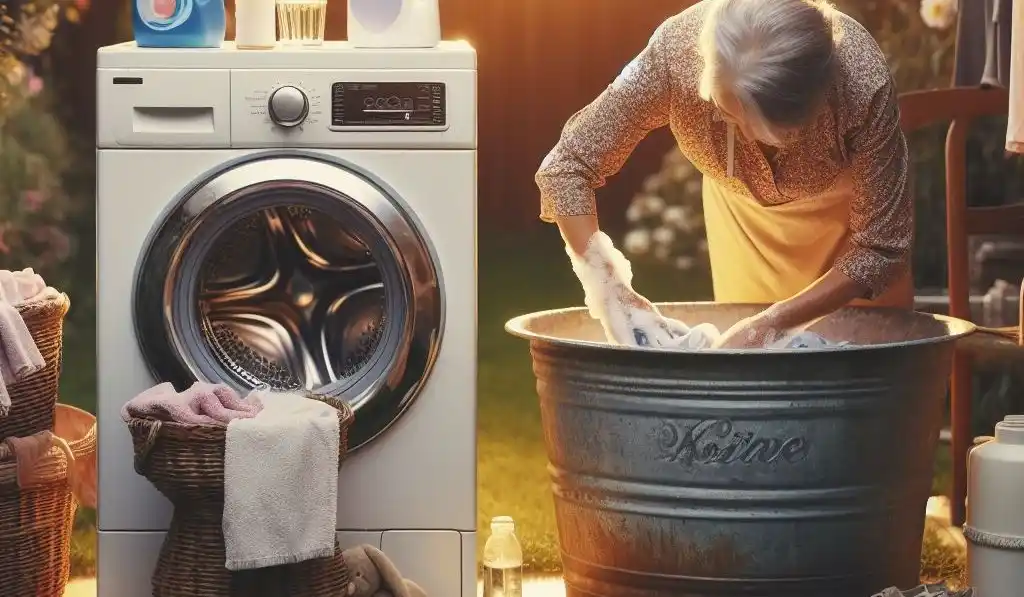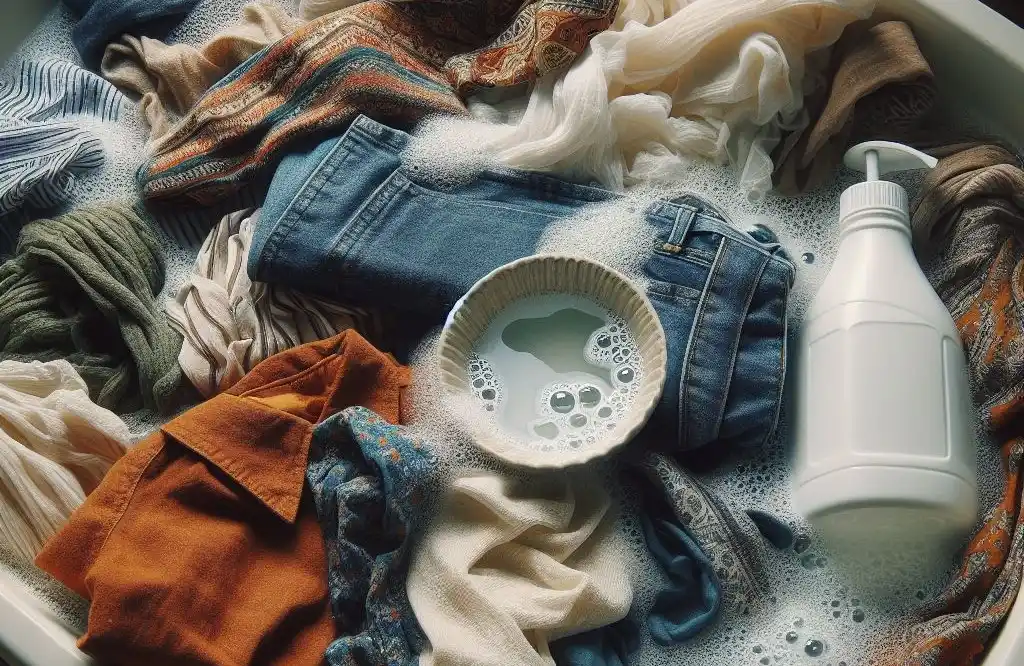Can I Wash Clothes With Body Wash? Full Guide To Use Body Wash as Laundry Detergent
Have you ever found yourself staring hopelessly at an empty laundry detergent bottle the night before a big day, with a pile of dirty clothes threatening to take over your bedroom? We’ve all been there. When you’re in a pinch, you start eyeing that mostly full bottle of body wash in the shower and wonder – can I wash clothes with body wash?
While body wash isn’t the optimal choice for washing laundry, the short answer is yes, you technically can use body wash to wash your clothes in an emergency. However, there are some caveats, which we’ll cover in detail below.
In this comprehensive guide, we’ll discuss:
- Whether body wash works as an effective laundry detergent substitute
- The pros and cons of using body wash to wash clothes
- What kind of body wash is best for laundry
- How to use body wash to hand wash or machine wash clothes
- Additional tips and alternatives for washing clothes without detergent
So read on to get the full low-down on using body wash as laundry detergent!
Does Body Wash Work as Laundry Detergent?
Laundry detergent and body wash are formulated quite differently for their specific uses. Laundry detergent is designed to break down dirt, oil, and stains while protecting fabric over many washes. The key components it contains are:
- Surfactants – loosen and remove soils
- Builders – soften water and boost surfactant cleaning
- Bleaches – whiten fabrics and remove stains
- Enzymes – break down proteins, starches, fats
- Fragrances – leave clothes smelling fresh
On the other hand, body wash is meant for use on the human body. It contains:
- Surfactants – create a sudsy lather
- Emollients and moisturizers – hydrate skin
- Fragrances – impart a pleasant scent
You’ll notice that the main overlap is surfactants, which provide the cleaning action. Body wash does also contain some emollients and fragrances.
So in a pinch, body wash can get your clothes reasonably clean by loosening dirt and oils. But laundry detergent is specially formulated to be effective over many cycles, while protecting fabric integrity.
Key Differences:
- Laundry detergent is designed for use in washing machines
- Laundry detergent contains higher levels and a special blend of surfactants to remove a variety of stains
- Laundry detergent better lifts away body oils and particulate soils
- Laundry detergent contains whitening agents to brighten fabrics
- Laundry detergent is specifically tested on fabrics to prevent damage over many washes
Pros and Cons of Using Body Wash as Laundry Detergent
Before using body wash to wash your clothes, consider the following pros and cons.
Pros:
- Gets clothes reasonably clean in a pinch
- Commonly on hand when you run out of detergent
- Typically a mild formula safe for most skin types
- Imparts a fresh, pleasant fragrance
Cons:
- Not designed for use in washing machines
- Doesn’t provide the fabric cleaning power of laundry detergent
- Could leave behind excess body oils or soils
- Contains moisturizers that may leave residue
- More prone to suds overflow in machine
- Frequent use risks fabric damage over time
- Can be more costly than laundry detergent per wash
The bottom line is that while body wash can get the job done once or twice when you’re out of options, it shouldn’t replace heavy-duty laundry detergent as your go-to for regular clothes washing.
Can I Wash Clothes With Body Wash

We’ve all been there: staring at a pile of dirty laundry with a sinking feeling of “out of detergent.” In a moment of desperation, you might eye that bottle of body wash in the shower, wondering, “Can I use this in a pinch?”
The answer, like most things in life, is nuanced. While technically you can wash clothes with body wash, it’s not the ideal (or even recommended) solution. Let’s delve into the sudsy details and explore better alternatives for keeping your clothes clean.
Why Body Wash Isn’t the Best Laundry Buddy:
The body wash is formulated for gentle cleansing of skin, not the heavy-duty grime tackling needed for fabrics. Here’s why it’s not the best laundry choice:
- Ineffective Cleaning: Body wash lacks the enzymes and surfactants found in laundry detergent, which are crucial for breaking down dirt, sweat, and stains.
- Residue Buildup: Body wash often contains moisturizing agents and conditioners that can leave a residue on clothes, leading to stiffness, discoloration, and even mildew growth.
- Fabric Damage: Some body washes, especially those with harsh fragrances or dyes, can damage delicate fabrics or cause color bleeding.
- Sudsy Situation: Body wash creates excessive suds, which can be problematic for washing machines, potentially leading to overflowing or malfunctioning.
Alternatives to Body Wash for a Sparkling Clean:
Before resorting to body wash, consider these more effective (and fabric-friendly) options:
- Dish Soap: A surprisingly good substitute, dish soap cuts through grease and grime similar to laundry detergent. However, use a mild formula and go easy on the amount to avoid excessive suds.
- Shampoo: Similar to dish soap, a gentle shampoo can be used in a pinch. Opt for a clarifying or volumizing formula, which are less likely to leave residue.
- Bar Soap: A classic choice, bar soap can be effective for lightly soiled clothes. Grate some into the wash cycle or lather directly onto stains for pre-treatment.
- DIY Laundry Detergent: Whip up a natural detergent using readily available ingredients like baking soda, vinegar, and castile soap. This eco-friendly option is gentle on clothes and skin.
Remember: When using any substitute, always start with a small amount and test it on an inconspicuous area of the garment first.
While washing clothes with body wash is technically possible, it’s far from ideal. The potential for ineffective cleaning, residue buildup, and fabric damage makes it a risky choice.
Stick to laundry detergent whenever possible, or explore the alternative options mentioned above. By choosing the right sudsy solution, you can keep your clothes clean, fresh, and free from unwanted surprises.
Bonus Tip: If you’re frequently caught in a detergent-less predicament, consider investing in a travel-sized laundry detergent pack. These compact pods are perfect for handwashing delicates or tackling small loads on the go.
I hope this deep dive into the world of laundry alternatives has answered your question and provided some helpful tips for keeping your clothes clean and happy, even when detergent supplies run low. Remember, a little research and resourcefulness can go a long way in maintaining a sparkling wardrobe!
What Type of Body Wash Works Best?
If you do decide to use body wash in a laundry emergency, what type works best? Here are a few pointers:
- Bar soap – More economical and contains similar surfactants as a liquid body wash. Grated bar soap dissolves reasonably well.
- Body wash vs hand soap – Both can work in a pinch! However, body washes tend to have more moisturizers while hand soaps are more stripping.
- Fragrance-free – Prevents heavy fragrance residue and is ideal for sensitive skin.
- Gentle/sensitive skin – Extra mild surfactants lower irritation risk on skin and fabrics.
- Non-moisturizing – Less greasy residues.
- Liquid over creamy – Easier to rinse away film and residues.
Ideally, pick a body wash with sensitive skin benefits if you tend to have allergic reactions or skin irritation. And steer clear of heavy moisturizers or creams which leave a residue.
When evaluating products, check that body wash doesn’t contain oils that could stain fabrics, like mineral oil, coconut oil, or Vitamin E. Aim for gentle, fragrance-free, and non-comedogenic (won’t clog pores).
How to Wash Clothes By Hand With Body Wash

If you need to hand wash delicate clothing items, body wash can work when diluted properly. Here’s a simple process:
What You Need
- Body wash
- Wash basin, sink, or bucket
- Cool water
- Soft bristle scrub brush (optional)
Instructions
- Fill a sink or bucket halfway with cool water. Avoid hot temperatures to prevent fading.
- Add a small amount of body wash – start with 1⁄4 cup per gallon of water.
- Swirl water gently to dissolve and make suds. It shouldn’t be an overly thick foam.
- Add clothing and let soak for 15 minutes up to a few hours if heavily soiled.
- Swish gently and scrub any stains if needed. Avoid vigorous motions that could damage delicate fabrics.
- Drain wash water and rinse garments thoroughly with cool clean water. Repeat rinses if needed until the suds are gone.
- Follow garment care instructions for drying. Lay flat or hang dry to maintain shape.
The soak allows time for body wash to loosen dirt while gentle motion prevents snags. Properly rinsing away all soap residue is key! This hand wash method is ideal for delicates like sweaters, intimates, swimwear, or anything labeled hand wash only.
Using Body Wash in Washing Machines
If you need something stronger to power through a whole laundry load, body wash can go through the wash cycle but requires caution.
For top-loading machines, a lower water level lessens the risk of overflowing suds. In front loaders, select a low-foam cycle if possible or reduce the amount of body wash.
Here is a basic step-by-step:
Washer Prep
- Clean out the lint trap and wipe down any visible grime in the machine. Debris can lead to soapy residues getting trapped in clothes.
- Run a rinse-only “purge” cycle to remove any built-up gunk. Or wipe debris off drum walls manually.
Wash Cycle
- Add laundry load and set to a smaller than usual water level if your machine allows.
- Add body wash substitute. For the average top loader, use 1/4 cup liquid or grated bar soap for small loads, 1/3 cup for medium loads, and 1⁄2 cup for large loads. Cut quantity in half for front loaders prone to extra suds.
- If available, choose a low-foam cycle. Or select cold water temperatures overall.
- After the wash finishes, check the clothes over thoroughly. Rewash as needed if there’s excess slimy, slippery residue that rinses didn’t remove. This is moisturizer and oils that didn’t properly wash out.
- Avoid fabric softener sheets on your body wash test run load, as it could worsen residue.
The key is closely checking that slick, filmy residue is fully rinsed away – repeated washings may help remove it. Lower temperatures also reduce excess suds. Skip the dryer sheets as well, as added lubricants with body oils risk making laundry feel greasy.
And remember – body wash works best for periodic emergency use, not as an everyday laundry routine!
Additional Tips for Washing Laundry Without Detergent
While body wash works decently well in a pinch, what else can rescue you from laundry predicaments? Before resorting to body wash on the regular, try out these tips:
- Stretch out the remaining actual laundry detergent – use less per load if running low until you can get to the store.
- Rinse out the detergent bottle with warm water into the load – leftover residue clings to the sides!
- Use baking soda – excellent odor removal and mild abrasive properties to boost cleaning. Won’t bleach.
- Use vinegar – lifts soap residue and brightens whites without a heavy scent like lemon juice. Contains low-level acid to dissolve grime.
- Use borax – formulated from sodium borate ore, lifts stains, and disinfect laundry loads with alkaline chemistry. Is banned in the EU but low risk overall.
- Use castile soap – made from plant oils like olive oil, this biodegradable cleaner cuts grease extremely well. Available as liquid or bars.
- Use dish soap – cuts grease decently, but not optimized for fabric care. May leave a residue.
- Use shampoo – a gentle hair cleanser is safest for delicates in small quantities. Rinse very thoroughly.
- Use laundry detergent alternative recipes – DIY blends like soap nut shells, washing soda, or grated soap bars work for non-synthetic eco-friendly home solutions in a bind. Can DIY dilute formulas based on load size.
- Spot treat heavily stained areas – Body wash/soap bars directly rubbed onto dried food stains, grease marks, etc, and left to soak for 30+ mins before washing removes most discoloration without adding excess cleaner to full load.
- Hand wash focus areas – Manually scrubbing shirt collars, sleeve cuffs, and laundry load parts that touch skin more before machine washing prevents body oil and deodorant buildup over time without needing heavy detergent all over.
Using heavy-duty laundry detergent truly is ideal for keeping clothes in top shape over many washes. But when caught empty-handed, a combination of the above detergent alternatives + body wash in moderation can get you through until your next shopping trip. Worst case, rewashing may be needed if residues persist.
And for critical job interviews, huge dates, or other must-look-perfect events? Resort to professional dry cleaning if clothing just isn’t coming fully clean minus detergent.
FAQs About Using Body Wash as Laundry Detergent
Have more questions about using body wash and soap products to wash your laundry? Here are answers to some of the most common queries:
Is body wash or hand soap better for washing clothes?
Both can work, but body wash contains more moisturizers for skin that may leave extra residue. Gentle hand soaps have simpler formulas that rinse cleaner.
Can I use a bar of soap to wash my laundry?
Yes! Grate up soap scraps or use a vegetable peeler. It should dissolve reasonably well. May require an extra rinse cycle vs liquid body wash.
Will body wash remove stains from laundry?
Unfortunately, stain removal isn’t a strong suit. Because body wash is focused on hydrating skin, it isn’t formulated with intense targeted stain-fighting ingredients. You’ll get better results from Oxiclean, dishwasher detergents, or other cleaners containing active oxygen, enzymes, or bleaches. Tide laundry detergent also contains proprietary stain fighters.
Can I use body wash for hand washing clothes?
Yes, body wash diluted in cool water works for gentle hand washing provided all soap residues are fully rinsed away afterward. It allows a targeted approach for delicates and custom scrubbing.
Will washing my clothes with body wash damage my washing machine?
Using a body wash infrequently likely won’t incur machine damage. But over time, excess suds can tax home washing machines. The occasional emergency body wash load gives way more flexibility than hand washing everything though when detergent runs out! Just be diligent in checking that no slippery residues remain before machine drying as heat can set them in fabric.
What soap brand works best to wash clothes?
Your most promising bets are whatever sensitive skin body wash you likely already have at home or a pure castile soap variety free from skin irritants. We recommend unscented Dr. Bronner’s Sal Suds or Baby Unscented Pure Castile Soap since both are formulated for laundry too.
Conclusion
Hopefully, this guide sheds light on using body wash as an emergency last-ditch laundry cleaner. While it can be effective for periodic use when you run out of detergent, body wash isn’t a 1:1 substitute for heavy-duty laundry formulations specially designed for fabric care. Using alternatives like baking soda, vinegar, and grated soap along with body wash periodically can bridge the gap until restocking the actual detergent.
And if a big interview, wedding, funeral, or photoshoot suddenly pops up? Don’t change clothes coming out dingy, stained, or covered in residue despite all your hard hand scrubbing. Head to the laundromat or dry cleaner as needed to look and feel your absolute best if homemade cleaning concoctions just aren’t cutting it that day!
What other soapy solutions have rescued you in a laundry crisis? Share your top non-detergent washing tactics with us below!








